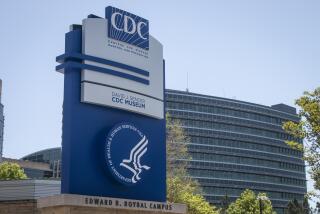Local Funding for Rape Exams Pursued After Governor’s Veto
- Share via
Frustrated by Gov. George Deukmejian’s veto last week of a state Senate bill that would have provided funds for hospital examinations of rape victims, health officials are turning to Los Angeles and other local jurisdictions to help them defray the cost of continuing the services.
An aide to Los Angeles City Councilman Zev Yaroslavsky, who heads the council’s Finance and Revenue Committee, said Wednesday that council researchers plan to look into whether the city has the resources to absorb more of the costs of rape examinations.
The spokeswoman, Alisa Katz, said Deukmejian’s veto would cause the loss of more than $1 million for Los Angeles hospitals.
“It would have meant considerable savings for us,” Katz said.
Despite reports last year that more than a dozen private hospitals in the Los Angeles area had stopped admitting sexually abused women and children because of a lack of funds for rape examinations, Deukmejian vetoed a $3-million appropriation Friday.
In a letter with the veto, Deukmejian said that costs for rape examinations “have been historically, and by statute, a local responsibility.” He noted that the bill would have set an “inappropriate” precedent by reimbursing cities for work performed by their law enforcement agencies.
Deukmejian said the state will provide “substantial financial assistance” to counties through the recently passed Trial Court Funding Act, which would free other local funds that could be used for rape examinations.
A typical rape examination, which checks for wounds and logs evidence for later use in criminal prosecutions, costs about $400. Last year, as a growing number of hospitals turned away rape victims, Los Angeles city officials agreed to boost the city’s reimbursement for each examination from $16 to $200. Los Angeles County similarly raised its compensation from $50 to $200.
Gail Abarbanel, director of the Rape Treatment Center at Santa Monica Hospital, said that since the veto, she worries “where the rest of the money will come from.”
“It is just not acceptable for rape victims not to have immediate access to treatment,” she said.
State Decision
Ironically, it was a decision made by the state in July, 1987, that led to the crisis. The state’s Office of Criminal Justice Planning ordered changes in hospital procedures that toughened rape examination and reporting guidelines to improve the courtroom chances of prosecuting sexual-abuse cases.
State Sen. David A. Roberti (D-Los Angeles) has begun urging Los Angeles officials to file rape examination claims with the Commission on State Mandates. The commission can order compensation to local jurisdictions for obeying state laws that are not properly funded.
Roberti said Wednesday that if the city’s claims were upheld by the commission, he would propose that funds be set aside in next year’s budget to pay for the examinations.
“The state has an obligation to participate in the costs,” he said.
Health officials cautioned that such an effort was unlikely to succeed. According to Kathleen Belkham, Los Angeles regional director for the Hospital Council of Southern California, Los Angeles County officials have already filed a claim on a rape examination, only to have it turned down by the commission.
“It’s not really an option,” she said.
But Fred Silva, a Roberti aide, responded that the Mandates Commission, which has new members, recently set up procedures that improve the likelihood of favorable claims by the city.
More to Read
Sign up for Essential California
The most important California stories and recommendations in your inbox every morning.
You may occasionally receive promotional content from the Los Angeles Times.













